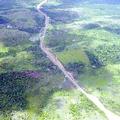 巴西總統魯拉13日簽署數項法令,其內容將擴展亞馬遜國家公園園區,並新增七處位於教宗州(Papá)西部之環境保護區,此區長久飽受土地糾紛及環境破壞等問題之苦。這次巴西政府擴大保護區的動作是為了因應BR163號公路建設計畫,以避免道路完工後造成公路週邊地區砍伐規模增加,防止過去在亞馬遜盆地的慘痛經驗重演。
巴西總統魯拉13日簽署數項法令,其內容將擴展亞馬遜國家公園園區,並新增七處位於教宗州(Papá)西部之環境保護區,此區長久飽受土地糾紛及環境破壞等問題之苦。這次巴西政府擴大保護區的動作是為了因應BR163號公路建設計畫,以避免道路完工後造成公路週邊地區砍伐規模增加,防止過去在亞馬遜盆地的慘痛經驗重演。
在其中一項法令裡,魯拉核准亞馬遜國家公園再擴大15萬公頃;而另一項法令則創設了巴西第一個「永續森林區」,此區同樣座落在教宗洲的西部,目的是促進該地區的永續發展。總計這類法令保護了教宗州境內約640萬公頃的土地。整體看來,亞瑪遜地區現在有4,580萬公頃的保護區,與2003年相比增加了三分之一倍。
魯拉並偕同環境部長席爾瓦(Marina Silva)與非政府組織代表會面。席爾瓦於會後表示,永續森林區的設立,將能增加約10萬個工作機會,生產大約400百萬瓦特(MW)的電力,以及每年可增收約8億3,252萬美元的稅額。席爾瓦說:「從這些數據看來,亞馬遜永續森林區的未來將別有一番新風貌。」
世界自然基金會巴西分會保護區計畫專員馬雷帝(Claudio Maretti)認為,保護區建立後,可有效阻止不法份子非法佔用公有地與破壞森林,進而達到『真正的』發展。」不過馬雷帝也警告:「政府必須快速立法保護其他地區,以因應開發的壓力。」
Brazilian President Luiz Inácio Lula de Silva on Monday signed decrees expanding Amazon National Park and creating seven new environmental protected areas in the western part of Papá state, a region marked by land disputes and environmental devastation. The protected areas are intended to ensure that the planned paving of highway BR163 does not result in uncontrolled increase of logging on lands bordering the road, as has historically occurred throughout Amazonia.
In one decree, President Lula added 150,000 hectares to the million hectare (2.47 million acre) Amazon National Park, and another establishes the country's first Sustainable Forest District, also located in western Pará and aimed at fostering sustainable development in the region. These decrees bring the total protected area in that region of Pará to 6.4 million hectares. The Amazon region as a whole now has 45.8 million hectares of protected area, an increase of one-third as compared to 2003.
Following a meeting with President Lula and representatives of nongovernmental organizations, the environment minister Marina Silva said the district will be capable of generating 100,000 jobs, producing around 400 megawatts of electricity, and collecting US$832.52 million in taxes each year. "These figures make a difference for the future of sustainable development in the Amazon region," Minister Silva said.
Cláudio Maretti, coordinator of the Protected Areas Program of WWF-Brazil, said the creation of protected areas is effective in keeping land grabbers from illegally assuming ownership of public lands and destroying the forests, accomplishing defacto development. "However," said Maretti, "the government must be faster in decreeing protected areas in other regions in case the pressures to abandon conservation intensify."


